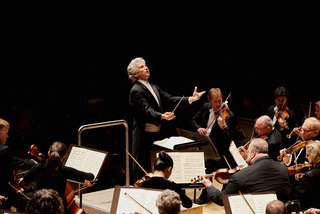|
Back
An ambitious cycle begins Toronto
Roy Thomson Hall
10/21/2015 - & October 22, 2015
Claude Debussy: La Mer
Ralph Vaughan Williams: A Sea Symphony (Symphony No. 1)
Erin Wall (soprano), Russell Braun (baritone)
The Toronto Mendelssohn Choir, Noel Edison (artistic director), The Toronto Symphony Orchestra, Peter Oundjian (conductor)

P. Oundjian (© Malcolm Cook)
The Toronto Symphony Orchestra has embarked on a five-year-long themed series of concerts called “The Decades Project” which will give an overview, decade by decade, of music composed through the twentieth century. This pair of concerts is the first in a series of three that will give a selective overview of compositions from the first decade of the tumultuous century. In the spring another series of three programs will give a similar view of the 1910-1919 decade. Two such series will follow in each season until after five years thirty or more programs will have completed an overview of the century’s complex and often contradictory musical history.
Two major works were chosen to lead off the survey, each with a diametrically opposed way of expressing the sea. Claude Debussy’s La Mer was completed and premiered in 1905. Apparently it took awhile to establish itself in the repertoire, but it most certainly has done so. The TSO’s performance emphasized the tumultuous side of the piece, not that this puts the performance at a comparative disadvantage. The endings of each of the three sections were admirably emphatic and, overall, the performance left an indelible impression. Debussy might stand accused of being calculatingly passive-aggressive in his approach to musical expressiveness, but the subtle delicacies are underlain by a solid muscularity.
When Jeff Melanson took over the job of orchestra CEO he vowed to enact changes to both retain the orchestra’s loyal audience and attract the universally-longed-for new audience. One highly visible change is the orchestra’s program booklet, now called Key, edited by a musicologist Hannah Chan-Hartley. The program notes have always been fine and these are retained. But now the covers feature works by local artists and the booklet seems more like something one would want to take home and keep. Another thing Dr. Chan-Hartley has done in this edition is design a three-page visual listening guide to La Mer, with indicators as to which instruments are being featured at various moments - I think it’s a brilliant thing and look forward to more of the same. Of course every silver lining has a cloud: just before the music starts, the lights go down and it is hard to follow the guide.
The program booklet also contained the full script for Ralph Vaughan Williams’ Sea Symphony, a work he started in 1903 and completed in 1908. One can fully understand why it took the best part of six years, what with wrestling with Walt Whitman’s oceanic tsunami of words as the effusive poet tries to embrace all of creation.
During its gestation Vaughan Williams went to Paris to study orchestration with Maurice Ravel, a man three years his junior. Ravel later remarked that VW was the only one of his students who didn’t write his (i.e. Ravel’s) music. The music truly is unlike Ravel’s (let alone Debussy’s), although I detected a Debussyesque sound at the end of the second section (the quietest), “On the Beach at Night Alone”.
It is such a huge, expansive piece I felt somewhat confounded at the end of the 20-minute first movement that there were still three more to go. The composer’s trademark “full lift-off” effects begin early in the first movement and, of course, recur throughout. The very pinnacle is reached in the fourth movement, on the line “O Thou transcendent”. The two soloists, soprano Erin Wall and baritone Russell Braun, had their work cut out for them and came through bravely. The Toronto-Mendelssohn Choir, with its full contingent of 130 singers, obviously embrace the work as well.
Both pieces on this initial outing of the Decades Project are very much of their era, what with Vaughan Williams a prime representative of what we regard as Edwardian confidence with its solid, foursquare musical statements often moderated with melancholy, while Debussy breaks away from the hitherto dominant Germanic influence which had arguably worked itself out as far as it could go. I eagerly anticipate the full five-year Decades Project cycle.
Michael Johnson
|